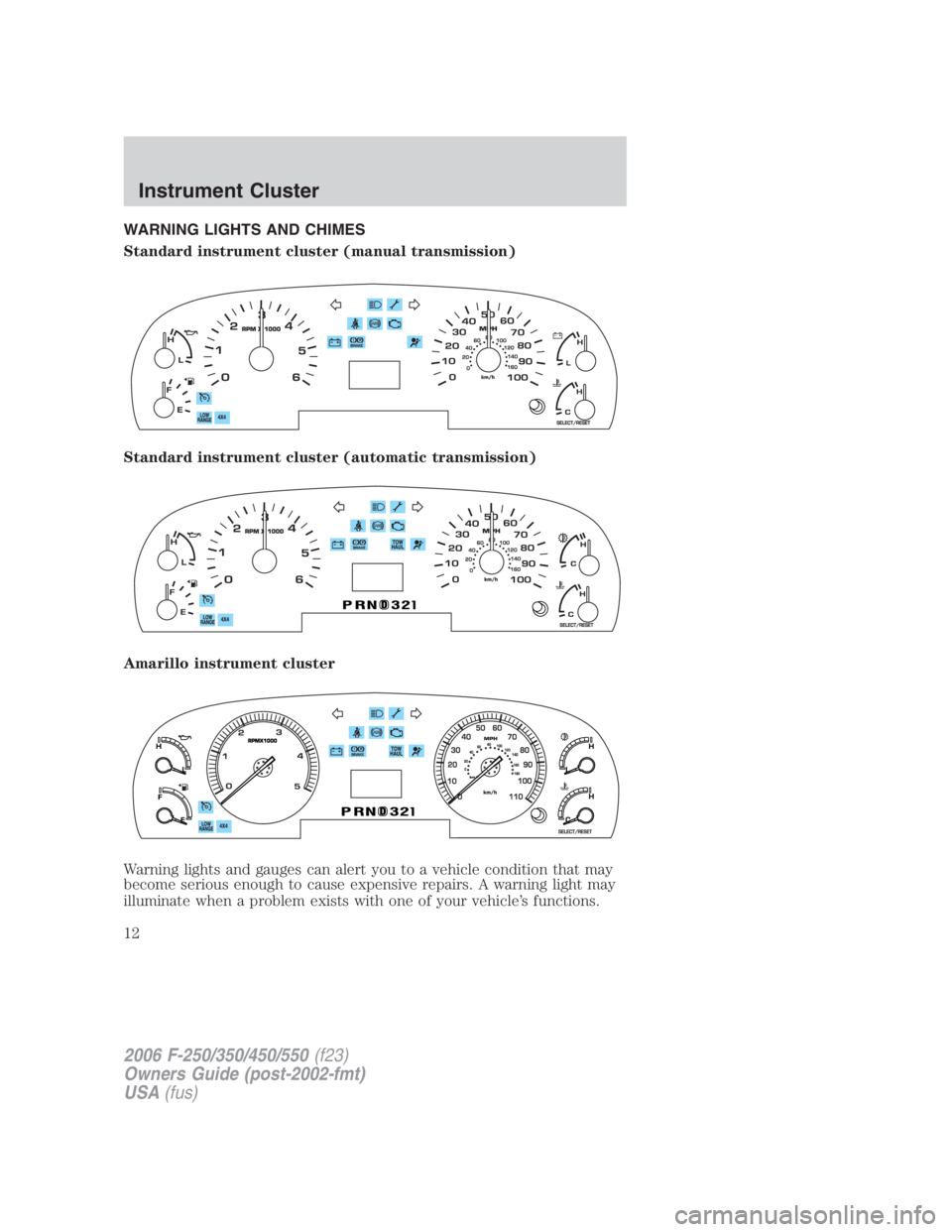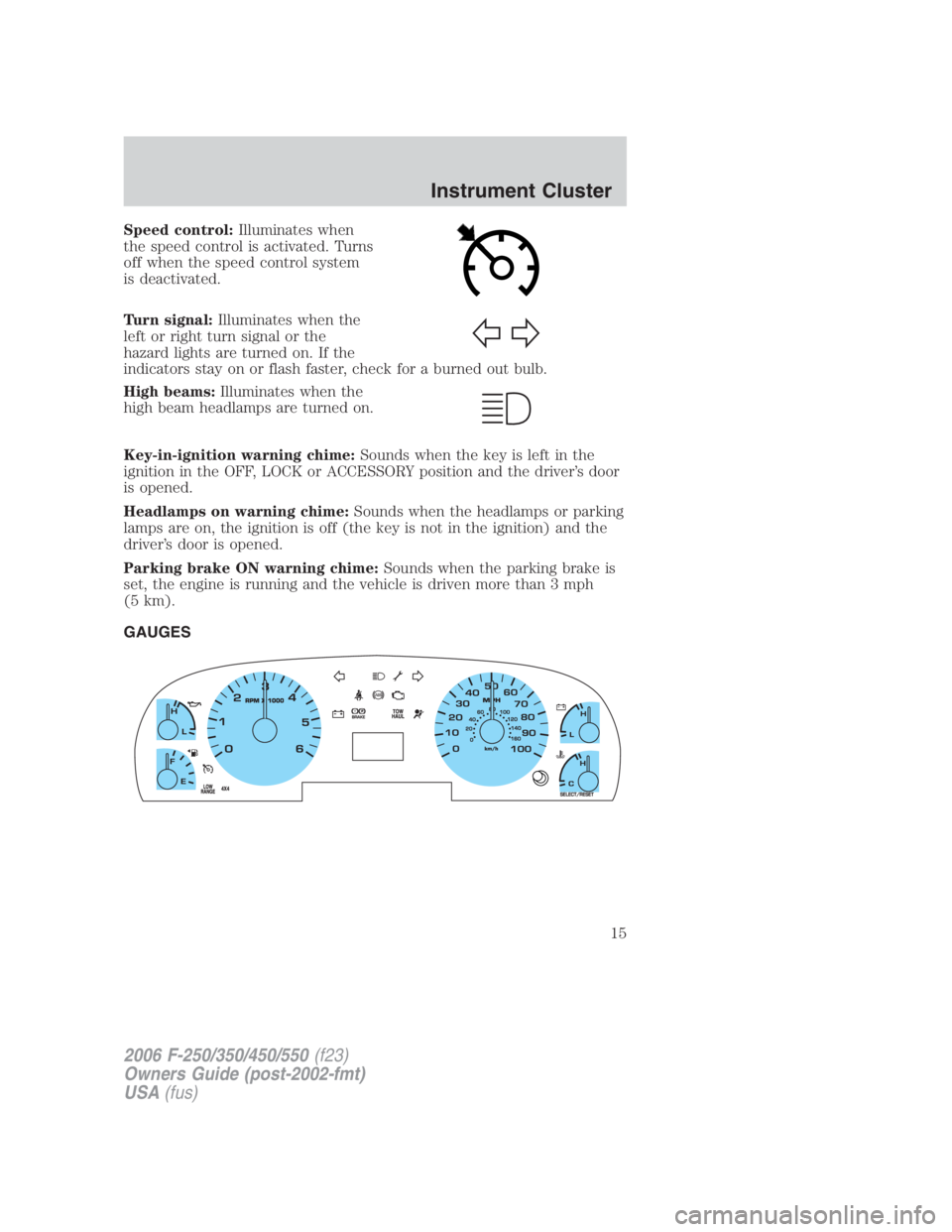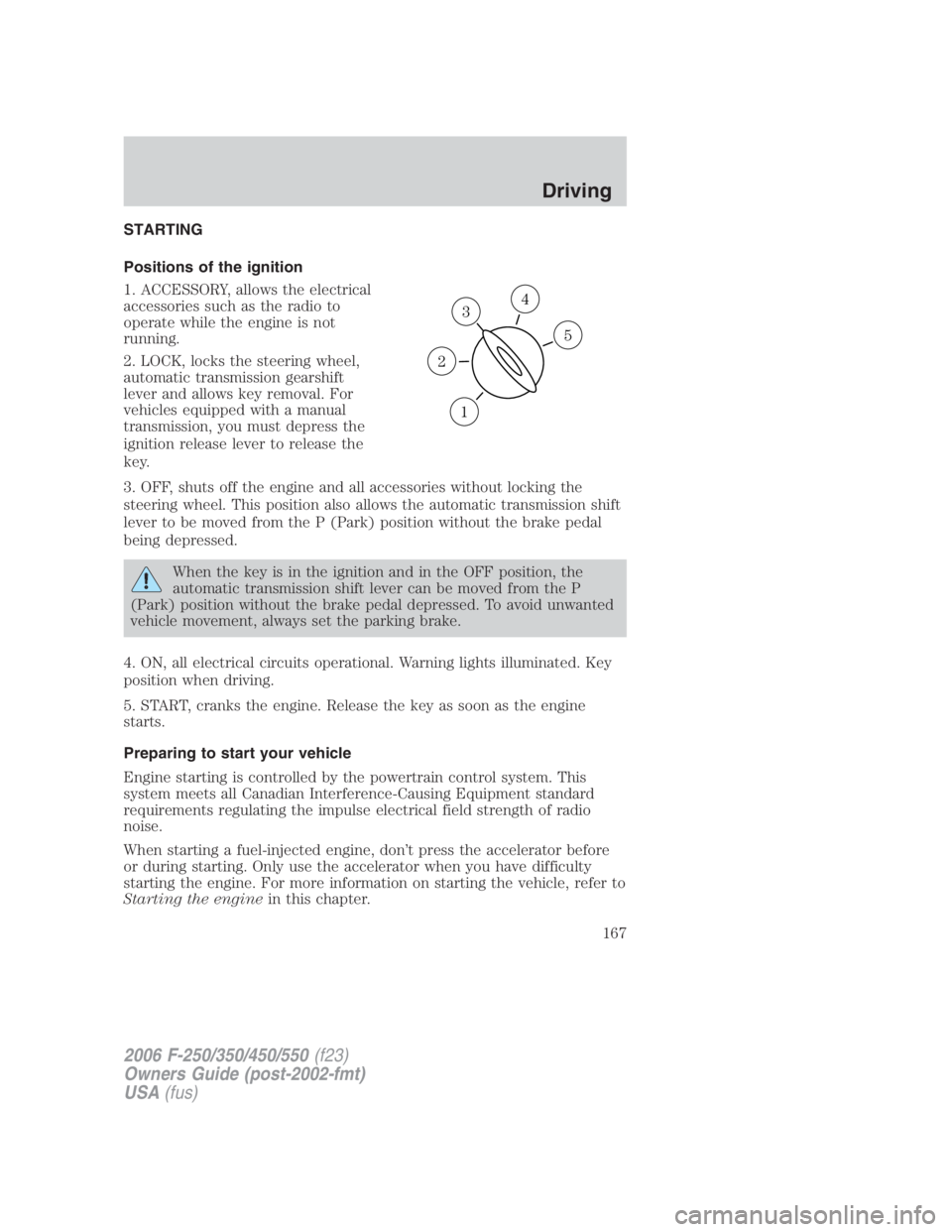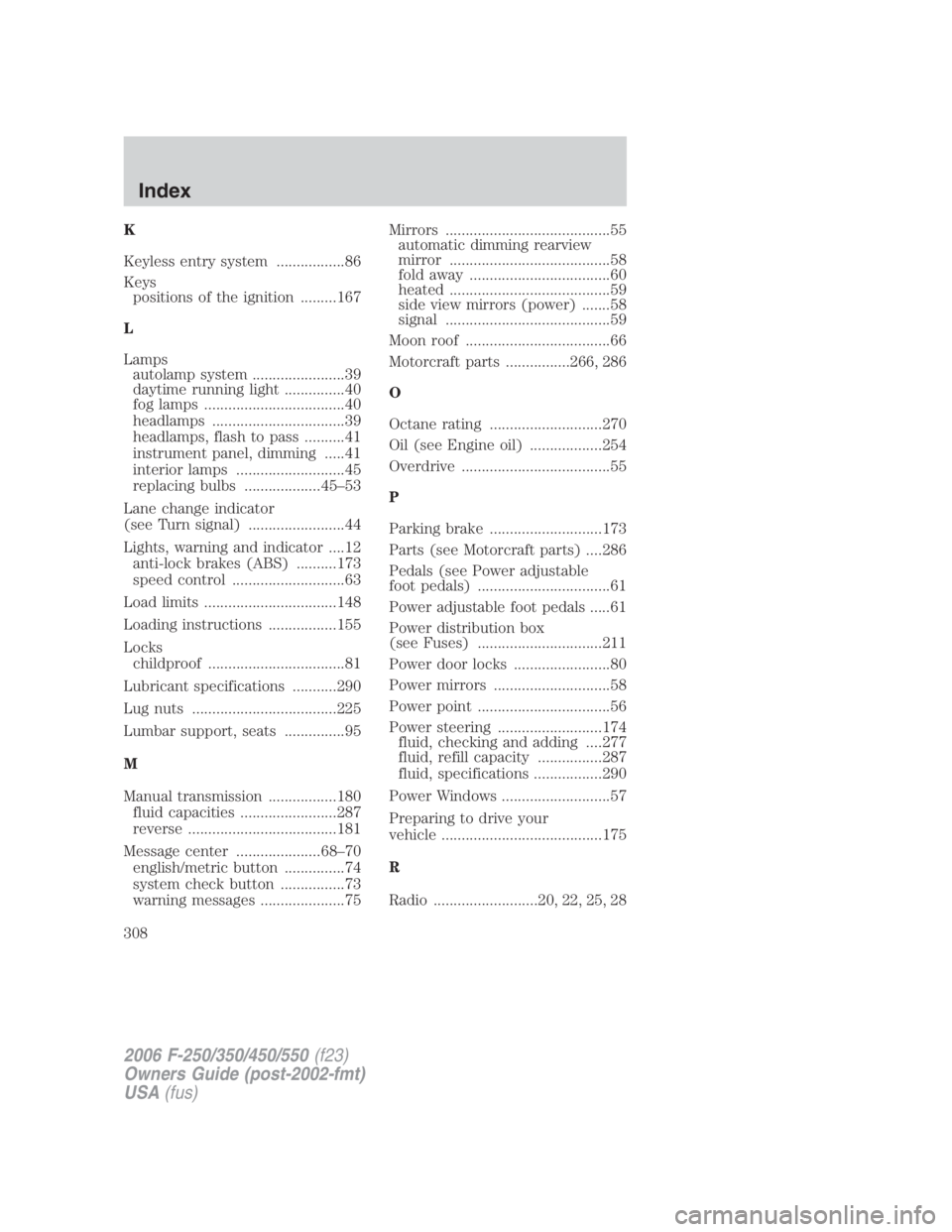2006 FORD F250 SUPER DUTY warning lights
[x] Cancel search: warning lightsPage 1 of 312

Introduction 4
Instrument Cluster 12Warning and control lights 12
Gauges 15
Entertainment Systems 20AM/FM stereo 20
AM/FM stereo with CD 22
AM/FM stereo cassette with CD 25
AM/FM stereo with in-dash six CD 28
Climate Controls 33Heater only 33
Manual heating and air conditioning 34
Automatic temperature control 36
Lights 39Headlamps 39
Turn signal control 44
Bulb replacement 45
Driver Controls 54Windshield wiper/washer control 54
Steering wheel adjustment 54
Power windows 57
Mirrors 58
Speed control 61
Upfitter controls 64
Moon roof 66
Message center 68
Locks and Security 80Keys 80
Locks 80Table of Contents
1
2006 F-250/350/450/550 (f23)
Owners Guide (post-2002-fmt)
USA (fus)
Page 12 of 312

WARNING LIGHTS AND CHIMES
Standard instrument cluster (manual transmission)
Standard instrument cluster (automatic transmission)
Amarillo instrument cluster
Warning lights and gauges can alert you to a vehicle condition that may
become serious enough to cause expensive repairs. A warning light may
illuminate when a problem exists with one of your vehicle’s functions.
2006 F-250/350/450/550 (f23)
Owners Guide (post-2002-fmt)
USA (fus)Instrument Cluster
12
Page 13 of 312

Many lights will illuminate when you start your vehicle to make sure the
bulbs work. If any light remains on after starting the vehicle, have the
respective system inspected immediately.
If your vehicle is equipped with a diesel engine, it has a unique cluster,
refer to Starting the engine in your 6.0 Liter Power Stroke Direct
Injection Turbo Diesel Owner’s Guide Supplement.
Service engine soon: The Service
engine soon indicator light
illuminates when the ignition is first
turned to the ON position to check
the bulb. Solid illumination after the engine is started indicates the On
Board Diagnostics System (OBD-II) has detected a malfunction. Refer to
On board diagnostics (OBD-II) in the Maintenance and Specifications
chapter. If the light is blinking, engine misfire is occurring which could
damage your catalytic converter. Drive in a moderate fashion (avoid heavy
acceleration and deceleration) and have your vehicle serviced immediately.
Under engine misfire conditions, excessive exhaust temperatures
could damage the catalytic converter, the fuel system, interior
floor coverings or other vehicle components, possibly causing a fire.
Electronic throttle control:
Illuminates when the engine has
defaulted to a ’limp-home’ operation.
Report the fault to an authorized
dealer at the earliest opportunity.
On vehicles equipped with a message center, “ENGINE FAILSAFE MODE”
will be displayed, refer to Message Center in the Driver Controls chapter.
Brake system warning light: To
confirm the brake system warning
light is functional, it will momentarily
illuminate when the ignition is turned
to the ON position when the engine
is not running, or in a position between ON and START, or by applying the
parking brake when the ignition is turned to the ON position. If the brake
system warning light does not illuminate at this time, seek service
immediately from your authorized dealer. Illumination after releasing the
parking brake indicates low brake fluid level and the brake system should
be inspected immediately by your servicing authorized dealer.
P!
BRAKE
2006 F-250/350/450/550 (f23)
Owners Guide (post-2002-fmt)
USA (fus) Instrument Cluster
13
Page 15 of 312

Speed control: Illuminates when
the speed control is activated. Turns
off when the speed control system
is deactivated.
Turn signal: Illuminates when the
left or right turn signal or the
hazard lights are turned on. If the
indicators stay on or flash faster, check for a burned out bulb.
High beams: Illuminates when the
high beam headlamps are turned on.
Key-in-ignition warning chime: Sounds when the key is left in the
ignition in the OFF, LOCK or ACCESSORY position and the driver’s door
is opened.
Headlamps on warning chime: Sounds when the headlamps or parking
lamps are on, the ignition is off (the key is not in the ignition) and the
driver’s door is opened.
Parking brake ON warning chime: Sounds when the parking brake is
set, the engine is running and the vehicle is driven more than 3 mph
(5 km).
GAUGES
2006 F-250/350/450/550 (f23)
Owners Guide (post-2002-fmt)
USA (fus) Instrument Cluster
15
Page 167 of 312

STARTING
Positions of the ignition
1. ACCESSORY, allows the electrical
accessories such as the radio to
operate while the engine is not
running.
2. LOCK, locks the steering wheel,
automatic transmission gearshift
lever and allows key removal. For
vehicles equipped with a manual
transmission, you must depress the
ignition release lever to release the
key.
3. OFF, shuts off the engine and all accessories without locking the
steering wheel. This position also allows the automatic transmission shift
lever to be moved from the P (Park) position without the brake pedal
being depressed.
When the key is in the ignition and in the OFF position, the
automatic transmission shift lever can be moved from the P
(Park) position without the brake pedal depressed. To avoid unwanted
vehicle movement, always set the parking brake.
4. ON, all electrical circuits operational. Warning lights illuminated. Key
position when driving.
5. START, cranks the engine. Release the key as soon as the engine
starts.
Preparing to start your vehicle
Engine starting is controlled by the powertrain control system. This
system meets all Canadian Interference-Causing Equipment standard
requirements regulating the impulse electrical field strength of radio
noise.
When starting a fuel-injected engine, don’t press the accelerator before
or during starting. Only use the accelerator when you have difficulty
starting the engine. For more information on starting the vehicle, refer to
Starting the engine in this chapter. 3
12 54
2006 F-250/350/450/550 (f23)
Owners Guide (post-2002-fmt)
USA (fus) Driving
167
Page 276 of 312

On board diagnostics (OBD-II)
Your vehicle is equipped with a computer that monitors the engine’s
emission control system. This system is commonly known as the On Board
Diagnostics System (OBD-II). This OBD-II system protects the environment
by ensuring that your vehicle continues to meet government emission
standards. The OBD-II system also assists the service technician in
properly servicing your vehicle. When the light illuminates, the
OBD-II system has detected a malfunction. Temporary malfunctions may
cause your light to illuminate. Examples are:
1. The vehicle has run out of fuel. (The engine may misfire or run poorly.)
2. Poor fuel quality or water in the fuel.
3. The fuel cap may not have been securely tightened.
These temporary malfunctions can be corrected by filling the fuel tank
with good quality fuel and/or properly tightening the fuel cap. After three
driving cycles without these or any other temporary malfunctions
present, the light should turn off. (A driving cycle consists of a
cold engine startup followed by mixed city/highway driving.) No
additional vehicle service is required.
If the light remains on, have your vehicle serviced at the first
available opportunity.
Readiness for Inspection/Maintenance (I/M) testing
In some localities, it may be a legal requirement to pass an I/M test of
the on-board diagnostics system. If your light is on, refer to the
description in the Warning lights and chimes section of the
Instrument Cluster chapter. Your vehicle may not pass the I/M test with
the light on.
If the vehicle’s powertrain system or its battery has just been serviced,
the on-board diagnostics system is reset to a “not ready for I/M test”
condition. To ready the on-board diagnostics system for I/M testing, a
minimum of 30 minutes of city and highway driving is necessary as
described below:
• First, at least 10 minutes of driving on an expressway or highway.
• Next, at least 20 minutes driving in stop-and-go, city-type traffic with
at least four idle periods.
2006 F-250/350/450/550 (f23)
Owners Guide (post-2002-fmt)
USA (fus)Maintenance and Specifications
276
Page 308 of 312

K
Keyless entry system .................86
Keys
positions of the ignition .........167
L
Lamps
autolamp system .......................39
daytime running light ...............40
fog lamps ...................................40
headlamps .................................39
headlamps, flash to pass ..........41
instrument panel, dimming .....41
interior lamps ...........................45
replacing bulbs ...................45–53
Lane change indicator
(see Turn signal) ........................44
Lights, warning and indicator ....12
anti-lock brakes (ABS) ..........173
speed control ............................63
Load limits .................................148
Loading instructions .................155
Locks
childproof ..................................81
Lubricant specifications ...........290
Lug nuts ....................................225
Lumbar support, seats ...............95
M
Manual transmission .................180
fluid capacities ........................287
reverse .....................................181
Message center .....................68–70
english/metric button ...............74
system check button ................73
warning messages .....................75 Mirrors .........................................55
automatic dimming rearview
mirror ........................................58
fold away ...................................60
heated ........................................59
side view mirrors (power) .......58
signal .........................................59
Moon roof ....................................66
Motorcraft parts ................266, 286
O
Octane rating ............................270
Oil (see Engine oil) ..................254
Overdrive .....................................55
P
Parking brake ............................173
Parts (see Motorcraft parts) ....286
Pedals (see Power adjustable
foot pedals) .................................61
Power adjustable foot pedals .....61
Power distribution box
(see Fuses) ...............................211
Power door locks ........................80
Power mirrors .............................58
Power point .................................56
Power steering ..........................174
fluid, checking and adding ....277
fluid, refill capacity ................287
fluid, specifications .................290
Power Windows ...........................57
Preparing to drive your
vehicle ........................................175
R
Radio ..........................20, 22, 25, 28
2006 F-250/350/450/550 (f23)
Owners Guide (post-2002-fmt)
USA (fus)Index
308
Page 310 of 312

Transfer case
fluid checking .........................283
Transmission
automatic operation .........55, 176
brake-shift interlock (BSI) ....176
fluid, checking and adding
(automatic) .............................279
fluid, checking and adding
(manual) .................................282
fluid, refill capacities ..............287
lubricant specifications ..........290
manual operation ....................180
Turn signal ..................................44
U
Upfitter controls .........................64
V
Vehicle dimensions ...................293 Vehicle Identification Number
(VIN) ..........................................300
Vehicle loading ..........................148
Ventilating your vehicle ...........171
W
Warning lights (see Lights)
.......12
Washer fluid
..............................253
Water, Driving through
.............198
Windows
power
.........................................57
Windshield washer fluid and
wipers
..........................................54
checking and adding fluid
.....253
replacing wiper blades
...........254
Wrecker towing
.........................232
2006 F-250/350/450/550 (f23)
Owners Guide (post-2002-fmt)
USA (fus)Index
310